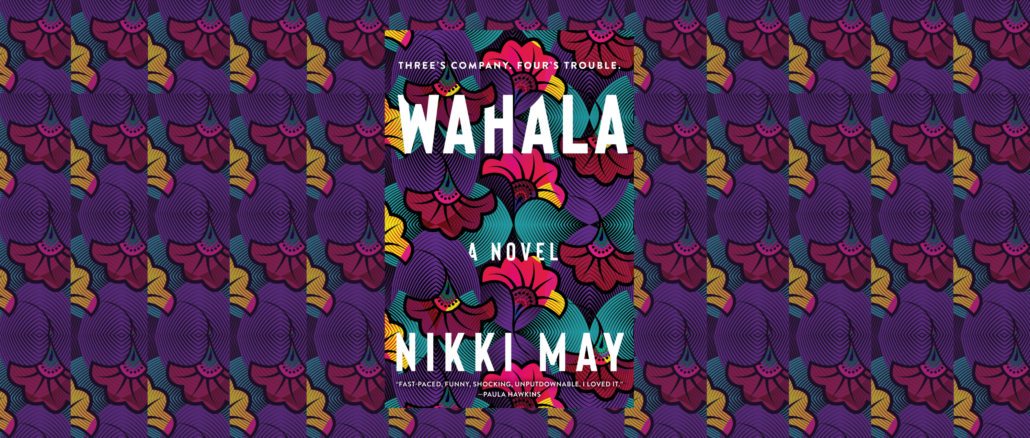
Navigating the oft-times treacherous, shocking and unforeseen potholes of life is frequently difficult – even more so when one is young, female, of mixed-race and living in the vibrant, yet at-times-daunting metropolis of present-day London. Such is most certainly the case for Ronke, Boo and Simi, the three stridently ambitious and glittering, yet complex and vulnerable, female, English-Nigerian, thirty-five year old protagonists from English-Nigerian author, Nikki May’s, stunning and far-reaching debut novel, “Wahala”.
Ronke, Boo and Simi, in this spellbinding and intricately nuanced tale, find themselves ‘living the dream’ (or are they?) in perpetually buzzing, hip and happening modern London. Ronke, a conscientious and compassionate dentist, has a caring Nigerian boyfriend, Kayode, a risk analyst, who Boo and Simi have ardent reservations about, but who Ronke is swooningly smitten with. Boo is for most of the week a reluctant stay-at-home Mum to young daughter, Sofia, and is married to a classy and devoted Frenchman, Didier. Boo, with a PhD in bioinformatics, works stoically two days a week at “Modern Science, a think tank”. Simi is employed for a fashion house, working as “brand executive”, and is married to white businessman, Martin. Martin is living the high life in New York, where he is employed temporarily – with Simi feeling lonely, yet loyally supported by her ‘besties’ Boo and Ronke. The three friends have been tight since university, where they met, in Bristol, England.
One day, out of nowhere, Simi is surprisingly contacted by a former friend, Isobel, from Lagos, Nigeria, where she grew up. Isobel is most definitely living in a different world, in many respects, to Simi, Boo and Ronke. As Simi confides to Ronke and Boo about Isobel, ” ‘ Her dad’s loaded. I mean, proper rich. He was in the government and in business. Legalised corruption….” Isobel has a seemingly never-ending amount of money to spend, has her own “driver-cum-bodyguard” and lives in a palatial townhouse. Isobel, initially, seems very keen to be firmly entrenched in Simi, Boo and Ronke’s friendship circle, and comes across as being a ‘perfect fit’ for the trio to have as a friend. Isobel appears vehemently encouraging and supportive, and someone Simi, Boo and Ronke can be glad to have in their corner – Isobel is forever wanting to meet up with her new friends, often at humming and ‘happening’ clubs and bars, where the friends shimmer and glow in stylish outfits, and goes out of her way to be a running mate for Boo.
Devastatingly, as Simi’s, Boo’s and Ronke’s lives begin to shatter and crash, Isobel’s intentions and actions towards the three are put under an illuminating microscope, and no-one’s life will remain as it had been pre-Isobel. Simi and Boo have been defiantly keeping life-altering secrets from their unsuspecting husbands (including a terminated pregnancy and an affair), while Ronke feels on frosty and shaky ground with Kayode for constricting reasons revealed as the novel progresses.
Why does Simi’s father tell her to keep away from Isobel? Why has Isobel told her new ‘friends’ that her mother, Irina, is dead, when Irina is alive and living in Moscow?
Themes of societal racism permeate this at-times delicately nuanced, and at-times tectonically-shifting, novel. For instance, when Ronke has a stalker, Mr Owen, who turns up unannounced at Ronke’s flat and Kayode goes to protect Ronke, the police turn up and immediately assume that Kayode is the attacker and law-breaker, not (white) Mr Owen. As Kayode laments of the incident to Ronke, “You have no idea what it’s like to be a black man in the wrong place at the wrong time “. Even Boo is a tad racist as she exclaims to Simi, Isobel and Ronke about their (black) Nigerian fathers marrying their (white) English mothers, ” ‘ What on earth were our mothers thinking?……we’re talking the seventies. Why would any sane English woman go for an African bloke?”. Boo goes on to say “Knowing how much it would upset your parents, that you’d be stared at on the street, that your kids would be picked on”.
Nikki May, in writing “Wahala”, has written a stunningly intelligent, insightful and soaring social commentary of what it can be like to be not white, and living in London today, as well as a heartbreakingly painful observation on the lives of women who seem to ‘have it all’, but are held back by choices that are not always in their own, and those they love, best interests.
Being a dog lover, I couldn’t resist including in this review the tribute Nikki May gave to her treasured dogs in the acknowledgements for “Wahala”. Nikki writes “To the greatest dogs in the world: Tosca, Petra, Fela and Lola. All the best ideas came on our walks “.
“Wahala” captivated me as a reader from the first page to the last, and I can’t wait to see what Nikki May writes next.


Leave a Reply